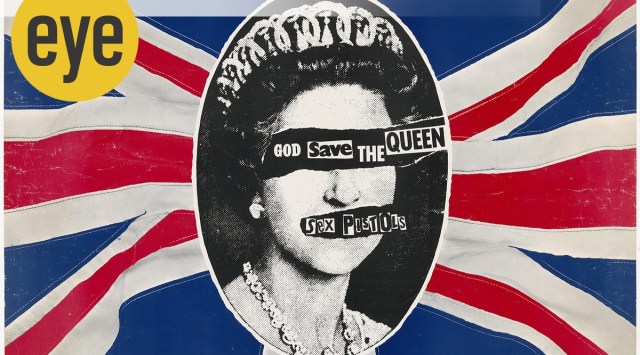- India
- International
Why the world of music has had a long, tumultuous relationship with Queen Elizabeth II
From punk rockers Sex Pistols, The Smiths to The Beatles, everyone had a song on the Queen
 The cheeky Sex Pistols poster from the ’70s
The cheeky Sex Pistols poster from the ’70sLast week, when Queen Elizabeth II, England’s longest reigning monarch, passed away, the British national anthem — God save the queen — was replaced with God save the king, after Charles III took the throne. Her death has raised questions around constitutional monarchy and obeisance to the royals. But this is hardly new. For years, artistes have expressed their dissent through music.
In 1977, English punk rock biggies, Sex Pistols, attempted their own version of UK’s national anthem. They sang: God save the queen/ She’s not a human being/ And there’s no future/ And England is dreaming, an example of a country’s internal turmoil — economic crisis and stagflation — that gave rise to punk subculture, largely characterised by anti-establishment views.
While the song was banned immediately by the BBC, 11 people including the band’s manager, were arrested post performance of the song on a boat, named Queen Elizabeth, on the Thames. The song in the band’s only studio album, Never Mind the Bollocks, Here’s the Sex Pistols (Virgin Records, 1977) also coincided with the silver jubilee of the Queen’s accession. But besides the shock value, what was significant was that it showcased a clear division among people in the UK — ones with deference to the monarchy and those who thought it was outdated.
Buy Now | Our best subscription plan now has a special price
The band members — vocalist Johnny Rotten, lead guitarist Steve Jones, drummer Paul Cook, and bassist Glen Matlock — without any cheer and chow from the internet, managed to make a mark. They brought out a poster of Queen Elizabeth II using a photograph (taken by royal photographer Peter Grugeon) with the Union Jack in the background. The poster designer Jamie Reid had ripped the queen’s eyes and mouth and placed the title of the single and the band’s name, with letters from what seemed like press headlines. The song and poster remain among rock music’s most significant engagements with the monarchy.

Almost a decade later, in 1986, The Smiths created a sort of sequel to God save the queen. They called it, The queen is dead (Rough Trade). Played over flamboyant guitars, the insouciant vocals belonged to frontman Steven Morrissey, and guitarist Johnny Marr, who co-authored the song: Pass the pub that saps your body/ And the church who’ll snatch your money/ The queen is dead, boys/ And it’s so lonely on a limb. A blighting phrase, But when you are tied to your mother’s apron/No-one talks about castration, is a conversation with Charles, implying how he’d never come into his own, until his mother, the Queen, is finally resting. Many agreed. Many called it blasphemous.
The year before The Smiths, in 1985, American singer-songwriter Suzanne Vega recorded The queen and the soldier, an acoustic ballad recounting the story of a soldier examining his obligations to the Queen, for whom he “kills”. Your Highness, your ways are very strange, sings Vega, losing faith on behalf of the soldier and for the people who believed in the Queen.
Almost four years later, in 1989, Britain’s own — The Stone Roses — recorded Elizabeth, my dear, with very severe lyrics over the most amicable guitars. Ian Brown sang: Tear me apart, And boil my bones/ I’ll not rest, Till she’s lost her throne/ My aim is true, My message is clear/ It’s curtains for you, Elizabeth, my dear. It was a scathing attack, sung tenderly.
While others were outsiders (Vega was American, and The Smiths had Irish roots), the message hit home. The band (except their bassist Mani who was Irish) came with English working-class values and set the song to Scarborough Fair, a popular, centuries-old folk melody in England.
Years later, in 1993, The Pet Shop Boys — the English synth-pop duo — crooned Dreaming of the queen, speaking of an illusive encounter with the Queen and Princess Diana. The symbolism in the song is a reference to AIDS and how the Queen and Princess Diana reacted to the disease in the singer’s dream.
But years before the punk movement was asking people to rid themselves of the royal hangover, four Liverpudlians, whom the world knew as The Beatles, sneaked in a 23-second Her Majesty on their famed album Abbey Road (1969). But what’s interesting about the track is that it wasn’t listed on the album sleeve. A clandestine creation, it came out of the blue on the vinyl and hit the listeners with quite some surprise. Paul McCartney sang, Her Majesty’s a pretty nice girl / But she doesn’t have a lot to say / Her Majesty’s a pretty nice girl / But she changes from day to day/ I want to tell her that I love her a lot… With its anarchist lyrics, it borders on punk rock but it’s set to a rhyme-like music structure. McCartney has continued to sing it, including for the Queen in 2012.
So while Buckingham Palace spoke of political neutrality, musicians paid no such heed to conventions. They picked up microphones and articulated their feelings for the Queen. She possibly heard many of them, but she never commented on any.
Apr 19: Latest News
- 01
- 02
- 03
- 04
- 05






































